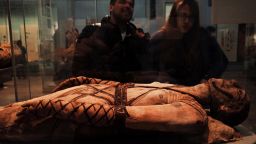An auction house in England has withdrawn human remains, including shrunken heads and ancestral skulls, from sale following an outcry.
The Swan auction house in Tetsworth, Oxfordshire withdrew more than two dozen lots from an upcoming auction titled “The Curious Collector Sale,” including an 18th-century Tsantsa shrunken head, which was expected to fetch £20,000-£25,000 ($26,000-$33,000) and was previously owned by Hugh Hefner, founder of Playboy magazine.
Other withdrawn lots include an ancestral skull from the Solomon Islands, another from the Fon tribe in Benin and a double ancestor skull from Congo.
The planned sale of another piece, described as a 19th-century horned Naga human skull, drew criticism from Neiphiu Rio, Chief Minister of the Indian state of Nagaland.
Rio wrote to India’s External Affairs Minister, S. Jaishankar, asking him to intervene “to ensure that the auction of the human remains of our people is halted.”
In his letter, Rio said he had been informed about the auction by the Forum for Naga Reconciliation (FNR), a grouping of organizations that works to reconcile different Naga political groups, some of which have engaged in armed struggle for independence from India in recent decades.
In its letter to Rio, the FNR said it “condemns this inhumane and violent practice where indigenous ancestral human remains continue to be collector’s items.”
“Such auctions continue the policy of dehumanization and colonial violence on the Naga people,” it added.
Another of those to criticize the planned sale was Laura Van Broekhoven, director of the Pitt Rivers Museum, which is part of the University of Oxford.
“Please, immediately pull from tomorrow’s auction the human and ancestral remains of Naga, Shuar, Dayak, Kota, Fon, Vili people and other communities in Papua New Guinea, Solomon Islands, Nigeria, Congo, Ecuador, Nagaland, Benin,” she wrote in a post on X on Tuesday.
CNN has contacted The Swan auction house, the FNR and the Pitt Rivers Museum for comment.
In September 2020, the museum removed a collection of shrunken heads from its collection as part of what it refers to as its decolonization process.
Museum staff removed human remains from its collection of more than 500,000 artifacts, following a three-year review of displays and programming “from an ethical perspective.”
Overall, 120 objects containing human remains were removed from view, along with an additional 71 non-biological objects that were in the same displays, the museum told CNN at the time.
The museum said in a statement that the changes were motivated by a desire to “deeply engage with its colonial legacy.”
CNN’s Lianne Kolirin contributed to this report.


